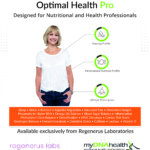Our unique scientific process – REAL
[intense_image image=”9189″ size=”medium500″ align=”right” title=”Chemist working cautiously with blue liquid and futuristic interface showing DNA diagram” caption=”Chemist working cautiously with blue liquid and futuristic interface showing DNA diagram”]
To support National DNA Day we thought you’d enjoy reading about the scientific process we undertake when investigating potential candidate SNPs or genetic variations.
Our unique scientific process is known as the REAL process and is based on four consecutive scientific pillars.
- Relevance
When we are looking at genetic variations, first thing we do is look at the relevance to nutrition and nutrigenomics making sure it’s a good candidate susceptibility gene. And this is really through biological studies. To do this our team of PHD researchers supervised by our scientific officer, Dr Eve Pearce PHD (Medicine), BANT, ION undertake a literature review where they investigate the research and the evidence papers that might be interesting and keeping up to date with new evidence and knowledge.
- Evaluation
Then once we have identified a candidate gene, we move onto the evaluation stage. This is very rigorous. Here the researchers deep dive into all the relevant scientific papers making sure that the population data matches up with for example the countries that will be using the product such in the UK and Ireland.
This is an area that we have to be very thorough as unfortunately in many European countries including the UK we don’t have any real regulation about how companies are presenting their genomic data to clients.
So, in the absence of regulation, myDNAhealth self-regulates to ensure we are as scrupulous as we can be and everything that we present to clients is evidenced based.
- Actionable
So finally once we have a candidate gene through to this stage, we start to look at whether the SNP is actionable. In other words what dietary or lifestyle interventions can be done to make an impact to this genetic variant.
- Lab testing
And then finally, our SNP gets passed over to our testing laboratory who have fantastic resources which we are fortunate to have. They are UK based and they make us a unique testing platform assay for each SNP.We don’t use a SNP chip-based method. We use a PCR method that is very individual for each SNP and vigorously tested including repeats and double testing to ensure we get 100% accurate results.


